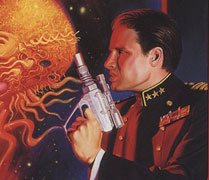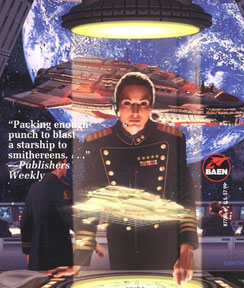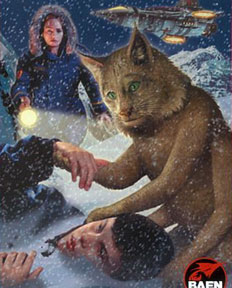When CS Forester
penned his famous saga of sea battles set in the Age of Sail, few anticipated
that his series would spawn not one, but two major science fiction series.
Although writing well after the start of classic science fiction authors
Arthur C. Clarke and Philip K. Dick, Forester chose to look to the past
to trace the meteoric career of Horatio Hornblower, a young midshipman
who rises to the rank of Admiral in a navy dominated by men of privilege
and often little else. Hornblower is intelligent, bold and dashing as
he extricates himself from one engagement after another, managing to
be decisively present for every major naval battle in a slightly fictionalized
version of Napoleonic Europe.
Two decades after
Forester penned his last Hornblower novel, science fiction authors David
Feintuch and David Weber began their own interpretation of the themes
explored by Forester, choosing to set their series in the future. Each
has borrowed different elements from Forester to weave their very own
epic "great man" series with differing success and following
among fans of military science fiction.
 David
Feintuch recreates best the salty atmosphere of harsh discipline, malnutrition
and dangerous multi-year voyages in his "Seafort Saga", set
in a post-apocalyptic earth ravaged by massive poverty, global warming,
pollution and the abolition of free general education. Through a freak
accident and faulty computer programming, midshipman Seafort finds himself
the ranking officer of the United Nations Ship Hibernia as it blunders
into the first discovery of alien life by man, an encounter that sets
the stage for a series of desperate battles on which the fate of dispersed
human colonies and ultimately the Earth itself is balanced. Seafort
is relentlessly driven by heroic tragedy and fate in the next six novels,
seeing his wife and close friends killed as a consequence of the actions
he must take to save his crew, the colony of Hope Nation and Earth itself.
David
Feintuch recreates best the salty atmosphere of harsh discipline, malnutrition
and dangerous multi-year voyages in his "Seafort Saga", set
in a post-apocalyptic earth ravaged by massive poverty, global warming,
pollution and the abolition of free general education. Through a freak
accident and faulty computer programming, midshipman Seafort finds himself
the ranking officer of the United Nations Ship Hibernia as it blunders
into the first discovery of alien life by man, an encounter that sets
the stage for a series of desperate battles on which the fate of dispersed
human colonies and ultimately the Earth itself is balanced. Seafort
is relentlessly driven by heroic tragedy and fate in the next six novels,
seeing his wife and close friends killed as a consequence of the actions
he must take to save his crew, the colony of Hope Nation and Earth itself.
The series is entertaining
and captivating, although some would say that Feintuch is too slavish
in his translation of the Hornblower theme, even going so far as to
recreate the infamous 17th century naval tradition of caning. Feintuch's
characters are also somewhat two-dimensional, with a disconcerting tough-guy
masculine quality seemingly lifted from John Wayne films, although many
seem to enjoy the relative lack of emotional entanglement as Seafort
overcomes impossible odds with steel and nerve.
The series starts
out with Midshipman's Hope, originally published by Warner
Books (now Time-Waner) in 1994 and continues with Challenger's
Hope, Prisoner's Hope, Fisherman's Hope, Voices
of Hope, Patriarch's Hope, and the latest installment, Children
of Hope, published by Ace
Books (part of the Penguin-Putnam group) last March.
In contrast to
the cold, masculine quality of Feintuch's Nicholas Seafort is the compassionate
and quiet confidence of Honor Harrington, the singular creation of David
Weber, a prolific writer, military history buff and one-time designer
of a series of war games.
Honor Harrington
is the daughter of a hard working middle-class family living on the
three-planet Star Kingdom of Manticore, a constitutional monarchy made
prosperous by its command of a series of wormhole junctions through
which a large percentage of the galaxy's trade fleet passes on its way
to market. Manticore also sits at the junction between two major empires
and a lawless confederation of planets plagued by pirates. If Manticore
is not being threatened by the expansionistic machinations of the People's
Republic of Haven or the lawless brutality of the Silesian Confederacy,
it is faced with the inscrutable intentions of the powerful and elusive
Anderman Empire.
 In
the first novel of the series, On Basilisk Station, we find the
young, newly minted commander of Her Majesty's heavy cruiser Fearless.
Exiled to a colonial backwater, Honor must prove herself fit to command
as she is haunted by an old adversary, Captain Lord Pavel Young. As
revenge for an incident from their days together in the naval academy,
Young abandons Harrington to patrol a planetary system rife with intrigue
and the beginnings of a Havenite plot to launch new war of territorial
expansion at the expense of Manticore's only colony, Medusa. Honor succeeds
brilliantly, exposing the Havenite plot, garnering the praise and attention
of the Queen and collecting her first following of passionate enemies
and allies alike.
In
the first novel of the series, On Basilisk Station, we find the
young, newly minted commander of Her Majesty's heavy cruiser Fearless.
Exiled to a colonial backwater, Honor must prove herself fit to command
as she is haunted by an old adversary, Captain Lord Pavel Young. As
revenge for an incident from their days together in the naval academy,
Young abandons Harrington to patrol a planetary system rife with intrigue
and the beginnings of a Havenite plot to launch new war of territorial
expansion at the expense of Manticore's only colony, Medusa. Honor succeeds
brilliantly, exposing the Havenite plot, garnering the praise and attention
of the Queen and collecting her first following of passionate enemies
and allies alike.
In the following
novels, Honor emerges victorious despite impossible odds in gripping
epic battles, is taken prisoner, leads the largest prisoner escape in
galactic history, is elected to the peerage of Manticore as Countess
Harrington, and is made the first female Steadholder on the once male-dominated
Republic of Grayson, steadfast ally of Manticore.
Like Horatio Hornblower
and Nicholas Seafort, Honor Harrington is driven by necessity to overcome
a series of endless and seemingly intractable obstacles as she navigates
her way through an impressive slate of adventures spanning ten novels
and a host of short stories. Unlike Hornblower and Seafort, however,
Harrington is a deliciously complex character rich in humanity, compassion,
and loyalty.
What gives the
series its cult-like
following is Weber's careful attention to a complex universe of
plots and exquisitely rendered background. The stories combine colorful
political intrigue, splendidly choreographed military battles, and impeccably
realistic characters whose rich relationships tie the events together
in a personable and accessible manner. No detail of the human experience
is ignored as the series explores a rich depth of feeling and tragedy,
the heady intoxication of victory, and the mature wisdom of lives lived
through conviction and honor. Weber is a master in evoking the quiet
terror of the endless wait before the fight, the painful blur of battle,
the determination and professionalism of a well-trained military, and
the stomach churning spectacle of politicians as they ceaselessly pursue
competing agendas to the good and detriment of the Kingdom.
 Sprinkled
within the grand plot are a series of interesting sub-plots that lend
a tantalizing texture to the narrative. For example, Honor has an inseparable
companion in the form of a treecat, a feline-like empathic species native
to Honor's home planet of Sphinx that adopts a small handful of exceptional
humans including the Queen herself.
Sprinkled
within the grand plot are a series of interesting sub-plots that lend
a tantalizing texture to the narrative. For example, Honor has an inseparable
companion in the form of a treecat, a feline-like empathic species native
to Honor's home planet of Sphinx that adopts a small handful of exceptional
humans including the Queen herself.
The treecats play
a subtle part during the course of the story; we are never quite sure
of their role in the grand scheme of things, although there is the implication
that they are not merely passive witnesses to the events unfolding around
their humans.
The characters
are also refreshingly rich in their expression of the diversity of humanity.
Although Weber does not have the courage of Lois McMaster Bujold in
openly incorporating alternate lifestyles and orientations into the
important characters, readers are also not subject the endless tide
of male Northern-European descendents who seem to dominate many works
of science fiction. On the eve of the launch of a manned space vehicle
by the People's Republic of China, not to mention the multi-ethnic crews
of our own space shuttle missions, Weber's treatment of ethnicity and
gender is reassuring. In an offhand way, we find out that the Queen
of Manticore as well as the entire Royal Family is African-American
(although perhaps African-Manticoran is more appropriate). The Anderman
Empire is demographically Chinese, although German is the official language.
In fact, Honor herself enjoys a dual heritage in several senses, with
parents born on different planets as well as having different ethnicities.
In short, the Honor
Harrington series one of the best science fiction series ever penned,
certainly my favorite science fiction series and destined to become
classic. Published by Baen
Books, the series includes ten books.
- On Basilisk
Station
- The Honor
of the Queen
- The Short
Victorious War
- Field of
Dishonor
- Flag in
Exile
- Honor Among
Enemies
- In Enemy
Hands
- Echoes of
Honor
- Ashes of
Victory
- War of Honor
The series also
includes four compilations of short stories by other science fiction
authors called Worlds of Honor, the most recent being The
Service of the Sword, due in April. Continuing a wonderful precedent
in science fiction publishing, Baen Books has made the first two novels
in the series, On Basilisk Station and The Honor of the Queen,
available for free in the Baen
Free Library. If you have a chance to read anything on your Palm
Pilot this spring, load up these two novels. Alternately, you can purchase
the latest novel, War of Honor, which includes a CD-ROM with
an electronic edition of all of the previous novels and short stories.


 David
Feintuch recreates best the salty atmosphere of harsh discipline, malnutrition
and dangerous multi-year voyages in his "Seafort Saga", set
in a post-apocalyptic earth ravaged by massive poverty, global warming,
pollution and the abolition of free general education. Through a freak
accident and faulty computer programming, midshipman Seafort finds himself
the ranking officer of the United Nations Ship Hibernia as it blunders
into the first discovery of alien life by man, an encounter that sets
the stage for a series of desperate battles on which the fate of dispersed
human colonies and ultimately the Earth itself is balanced. Seafort
is relentlessly driven by heroic tragedy and fate in the next six novels,
seeing his wife and close friends killed as a consequence of the actions
he must take to save his crew, the colony of Hope Nation and Earth itself.
David
Feintuch recreates best the salty atmosphere of harsh discipline, malnutrition
and dangerous multi-year voyages in his "Seafort Saga", set
in a post-apocalyptic earth ravaged by massive poverty, global warming,
pollution and the abolition of free general education. Through a freak
accident and faulty computer programming, midshipman Seafort finds himself
the ranking officer of the United Nations Ship Hibernia as it blunders
into the first discovery of alien life by man, an encounter that sets
the stage for a series of desperate battles on which the fate of dispersed
human colonies and ultimately the Earth itself is balanced. Seafort
is relentlessly driven by heroic tragedy and fate in the next six novels,
seeing his wife and close friends killed as a consequence of the actions
he must take to save his crew, the colony of Hope Nation and Earth itself. In
the first novel of the series, On Basilisk Station, we find the
young, newly minted commander of Her Majesty's heavy cruiser Fearless.
Exiled to a colonial backwater, Honor must prove herself fit to command
as she is haunted by an old adversary, Captain Lord Pavel Young. As
revenge for an incident from their days together in the naval academy,
Young abandons Harrington to patrol a planetary system rife with intrigue
and the beginnings of a Havenite plot to launch new war of territorial
expansion at the expense of Manticore's only colony, Medusa. Honor succeeds
brilliantly, exposing the Havenite plot, garnering the praise and attention
of the Queen and collecting her first following of passionate enemies
and allies alike.
In
the first novel of the series, On Basilisk Station, we find the
young, newly minted commander of Her Majesty's heavy cruiser Fearless.
Exiled to a colonial backwater, Honor must prove herself fit to command
as she is haunted by an old adversary, Captain Lord Pavel Young. As
revenge for an incident from their days together in the naval academy,
Young abandons Harrington to patrol a planetary system rife with intrigue
and the beginnings of a Havenite plot to launch new war of territorial
expansion at the expense of Manticore's only colony, Medusa. Honor succeeds
brilliantly, exposing the Havenite plot, garnering the praise and attention
of the Queen and collecting her first following of passionate enemies
and allies alike.  Sprinkled
within the grand plot are a series of interesting sub-plots that lend
a tantalizing texture to the narrative. For example, Honor has an inseparable
companion in the form of a treecat, a feline-like empathic species native
to Honor's home planet of Sphinx that adopts a small handful of exceptional
humans including the Queen herself.
Sprinkled
within the grand plot are a series of interesting sub-plots that lend
a tantalizing texture to the narrative. For example, Honor has an inseparable
companion in the form of a treecat, a feline-like empathic species native
to Honor's home planet of Sphinx that adopts a small handful of exceptional
humans including the Queen herself.